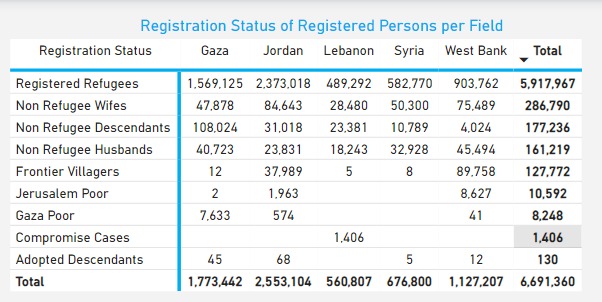We’ve discussed many times how the UNRWA definition of “refugee” is
completely at odds with the official UN definition of refugee, drastically inflating the number of real refugees they raise funds for. They include descendants of refugees that UNHCR would never consider refugees, they include two million Jordanian citizens, they include well over two million Palestinians who are citizens of the Palestinian Authority.
We’ve seen how their “registered refugee” metric includes
hundreds of thousands of people who no longer live in their areas of operation but whom UNRWA still counts as receiving services.
We’ve seen how hundreds of thousands of today’s UNRWA “registered refugees”
were not even refugees under their own definition when it started, but UNRWA registered them anyway and today hundreds of thousands of UNRWA’s “Palestine refugees” didn’t even descend from real refugees in 1948.
But this chart shows even more duplicity.
According to UNRWA, they provide services to over 770,000 people who aren’t refugees even according to its own bizarre and counterfactual definition.
Doing some digging, I found the
definition of “non-refugee” spouses and children.
UNRWA definition of “other eligible population” includes: (i) “Non-Refugee Wives” – women who are (or were) married to registered Palestine refugees, and as such are eligible to register to receive UNRWA services; (ii) “Non-Refugee Husbands” and “Non-Refugee Descendants” (including legally adopted children) – husbands and descendants of women who are Registered Refugees and are (or were) married to a non-refugee. They are also eligible to register to receive UNRWA services. Once they are registered with UNRWA, persons in this category are referred to as Married to Non-Refugee (MNR) Family Members.
So being married to a “refugee” makes one eligible to access free UNRWA health and housing. Which would have made Palestinian “refugees” very attractive marriage partners! According to this, some 450,000 non-refugees have married UNRWA aid recipients – an astonishing number.
Moreover, even if the spouses get divorced, he or she can keep getting those benefits forever – and so can their descendants! Not a bad deal!
UNRWA’s Commissioner-General (then Director) stated in his annual report to the General Assembly in 1961: “The Agency’s definition of a refugee eligible for assistance is narrowly drawn and stipulates the loss of both home and means of livelihood as a result of the 1948 hostilities. Substantial numbers of Palestine Arabs do not qualify for Agency relief on the technical grounds that they did not lose both home and means of livelihood, i.e. they may have lost their source of income and may be wholly destitute, but did not lose their home. This category has become known as ‘economic refugees’ and includes frontier villagers in Jordan, some destitute inhabitants of Jerusalem and the Gaza Strip, and certain Bedouin expelled after 1948. The General Assembly has more than once confirmed that, despite the undoubted need of these unfortunate people, the Agency’s mandate does not extend to them.
That was 1961. Since then, “The present Agency position is that, while registered for the purposes of receiving UNRWA services, these persons are not counted as part of the official registered Palestine refugee population. Except for descendants through the male line, UNRWA does not accept new applications from persons wishing to be registered in these categories.
So if a person was considered a “frontier villager” or “Jerusalem poor” in 1950, even though they weren’t refugees and the UN consistently said they are not to receive UNRWA services during the 1950s, today their descendants can continue to receive UNRWA benefits as a poverty stricken Palestinian – even if they live in a mansion in Ramallah.
Do the UNRWA donors even know that UNRWA spends 11% of its budget on people who aren’t “refugees” even under its own definitions?
The problem is, as we’ve mentioned before, that, unlike UNHCR, UNRWA has no means to remove anyone’s “refugee” status. The vast majority of UNRWA’s “Palestine refugees” are not refugees in any sense. And now we see that even non-refugees continue to receive UNRWA services forever.
There are more non-refugees under UNRWA’s own definition receiving services today than there were real refugees in 1948. That shows, in a nutshell, why UNRWA must be abolished.









